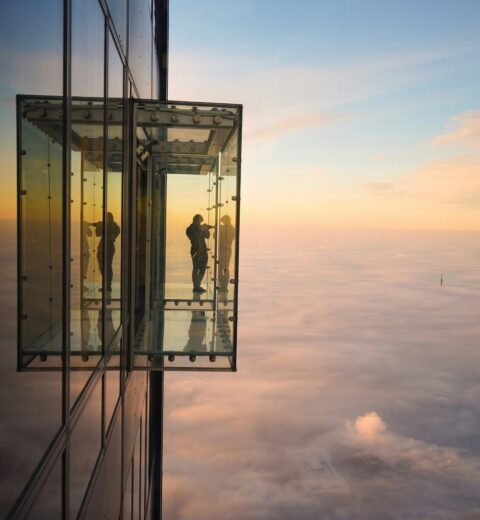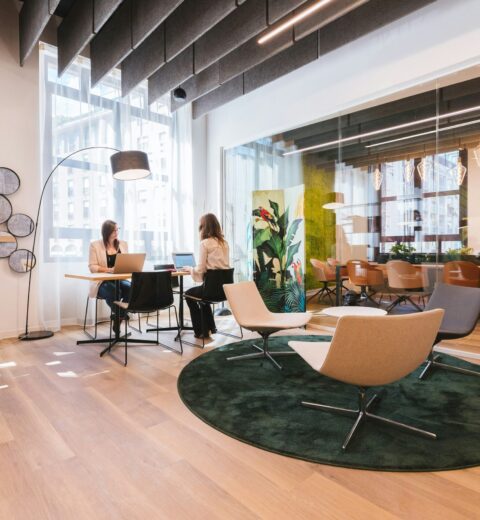The Unique Element of Coworking :: An Interview With Milad Fini @ Interchange
Week 9 – London. Happy Halloween! This week in The Workplace Series, eOffice founder Pier Paolo Mucelli, has visited Interchange and interviewed their CEO Milad Fini. The company, which is a company of Market Tech Holdings, is an organic accelerator offering services and support for businesses, in addition to managing their own coworking space in the heart of Camden.

The history behind Interchange started one year ago, in October 2015, when they bought the unique market place in Camden and created the coworking space Triangle. Four months ago, they opened their second space, Atrium, and today, we learn that a third location is to be opened in January 2017.
If we consider the real estate itself, it is an extraordinary area with high traffic of people. In fact, with its 35 million tourists per year, Camden is a perfect location for business. However, even though it is a unique neighbourhood that is surrounded by wealthy and green areas in central London, a lot of people don’t come to Camden after a certain age because of the great volume of tourists. So, in order to change this, Milad tells us that they have decided to create a product in order to make Camden more desirable for locals. He smiles and says: “And this is our product; coworking.”
“What is interesting about coworking,” Milad continues, “is that we believe the future of the growth within this country, especially after Brexit, is going to come from SMEs. Because what coworking does, is that it builds a platform, and it is the creation of this platform that is important. Here in Interchange, we have 150 startups that we provide with the environment and community to grow. For me, the word community is a really light word and, in my opinion, the meaning is not completely clear to the marketplace yet. Looking into the concept, you see that community is everything within a coworking space; it is break-out areas, it is the coffee, and it is the opportunity to knock on your neighbour’s door.”

“However, at Interchange, we wanted to further develop that concept of community, and actually bring in a bunch of startups which can monetise each other. This way, they will contribute to each other’s businesses, and that is the moment when you start creating a real product.”
Milad carries on telling us how the startup game is a bunch of ex-investment bankers like himself who all came up with an idea and now want to enter a greater startup, and are therefore in need of an office. He says “when a company takes an offer for a desk, it is because he likes the community, he likes the buzz which comes with an office, and that is one of the unique characteristics in here in Camden.” Milad pauses for a second before he continues: “What is interesting, though, is that a lot of these startups, they lack something. They just purely started up with an idea, and are now missing people doing either sales, technology development, graphic design or other important services within their business. Therefore, we are now introducing a product which is a list of services for our tenants; a startup can come and take on as many desks as it needs, and in addition be able to access all services needed that we provide through our sister companies.”
So, how does this process work? Pier Asks.
And Milad replies: “This process is all about knowing your clients, which is the critical thing. I need to know them, my team needs to know them, and the community needs to know each other. So, from a basic induction and knowing where your tenants are and what they are like, to knowing what they are looking for in terms of services. For instance, I am aware that I have tenants in the building right now that are looking for sales.”

We would like to know more about their coworking aspect of the business, and Pier asks:
So, it started as a huge project, entering real estate, creating a platform for the startup community. Can you describe a bit more about the coworking element?
“Well, today we have about 45000 sq ft of space in our two buildings,” Milad starts explaining. “I believe that there is no formula, which is the unique element of coworking. There is no formula as to how much break-out space there should be or how many coffee stations you should have. Also, there is no formula for the number of desks you should have.”
“Here at Interchange we have a great deal of open areas, but we also have private offices. Then we have stables market, which is a whole bunch of food operators, in addition to our own kitchen, Atrium kitchen. Furthermore, our space includes coffee platforms on every floor, and soon a bar upstairs, when the agreement with a big beer company is finalised.” Milad continues by explaining how Interchange is working to optimise their venues: “The atrium kitchen is going to be converted into a hot-desking area with a functionality of food and 150 desks. Our new building, opening in January, will have an additional 70 desks for hot-desking, meaning we will have about 900 desks in total.”

And what is your largest event space? Pier asks.
Milad replies: “When it comes to meeting and conference rooms, we have some on every floor. What’s so unique about us is that, unlike other coworking spaces, we are not limited to space. We have atrium kitchen and the break-out area on the upper ground floor which makes three spaces in the atrium building. Additionally, in the Triangle building, we have two spaces as well, ranging from anything between 5 and 300 guests.”

Pier: Over to another question; do you consider yourself as a property player or a service provider or both?
According to Milad, it is certain that the property and the real estate underpins the asset. “What is interesting,” he adds, “is that we see ourselves as an operating company providing coworking and hot-desking services to our community, and adding layers of services. Currently, we are about to do our first of few accelerating programs, which will take place in January.” In other words, Interchange is a service provider with aspects of property.

The interview goes on and Pier asks: Would you say that you focus on any particular sector?
Milad explains: “We focus on sectors that we understand by using our existing team. We are going to specialise in retail and fashion, in food we have already begun, and we are also going to be doing a fin-tech and gaming accelerating program in the beginning of next year, in 2017.”
Further, he tells us that the next thing for them will be to develop a fund that allows them to start investing in their startups. “That’s what makes our product-offering a unique opportunity for our community; being at Interchange and being in Camden within the tech-campus we are creating. This is an environment where people get involved and an environment where corporates and banks want to operate. This is where startups want to be in order to get exposure and growth, and a home for acceleration. We are a tech company and like to get our hands in the middle of it, pull up our shirts and understand how we can help these companies get from a two-desk great idea to a ten-desk-company with global expansion opportunities.”

The interview is coming to an end and Pier finishes by asking:
Do you believe that there may be too much competition in the London coworker provider market, or do you think there is room for growth?
“This is the UK, one of the strongest economies in the world. Looking at the market today, there is more than enough demand. I think that over the course of 12 months, I think the market will consolidate. There will be some companies that are connecting and merging into one as rent increases. I also think that we don’t really see the market. What is actually the market? The market is hot-desking, the market is coworking, but we are providing a different package. In fact, we are providing a campus and a schooling and educational system that makes us a mechanism for growth. You come in here, with an idea, and your idea has the potential to take you to the full growth, to seeding and investment, and a world of opportunities.”
Thank you for your great hospitality Interchange and Milad Fini!
Now, stay tuned for next week’s inspiring interview with Library private member’s club founder Ronald Ndoro.

Photo credit: Christopher Roche Photography



